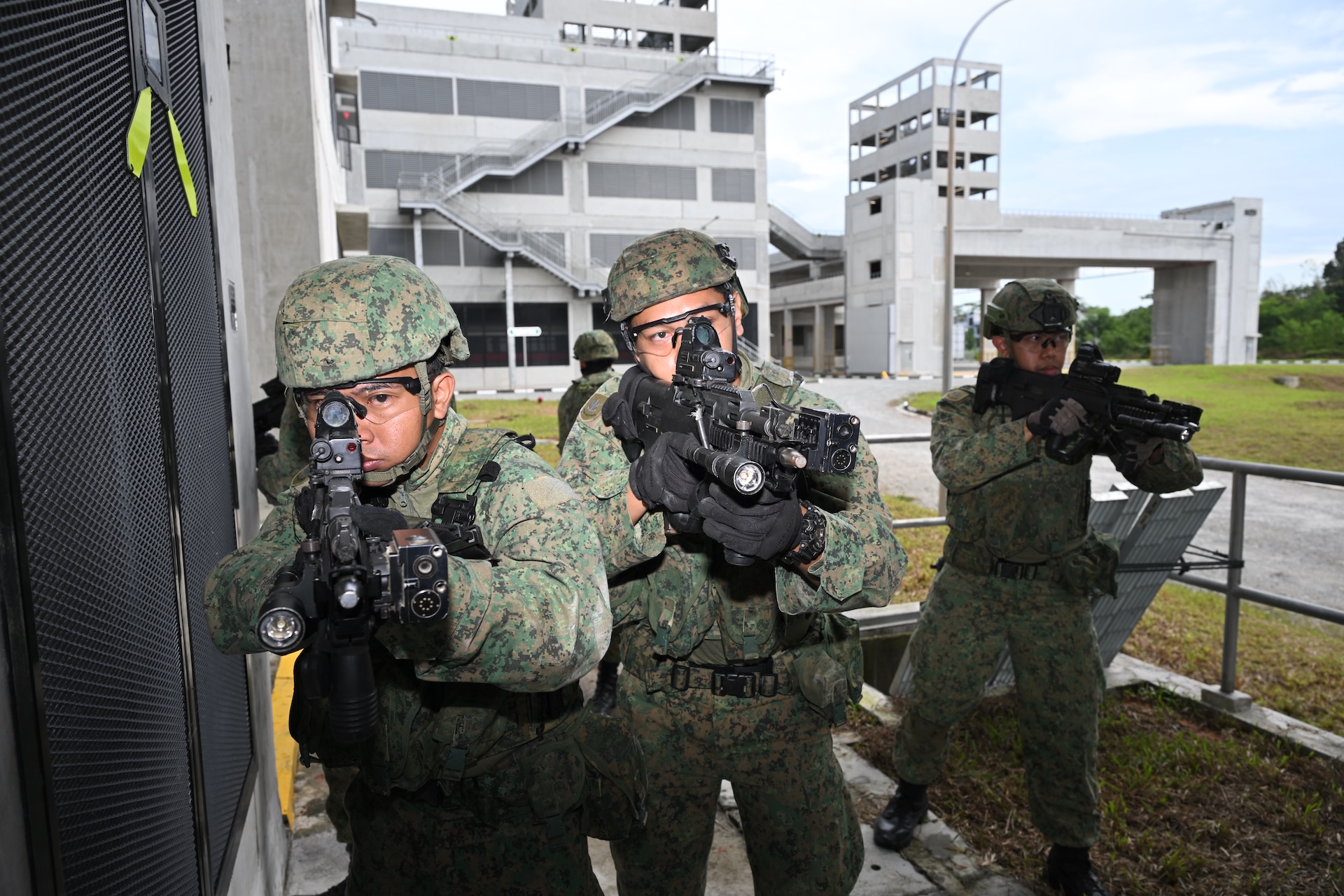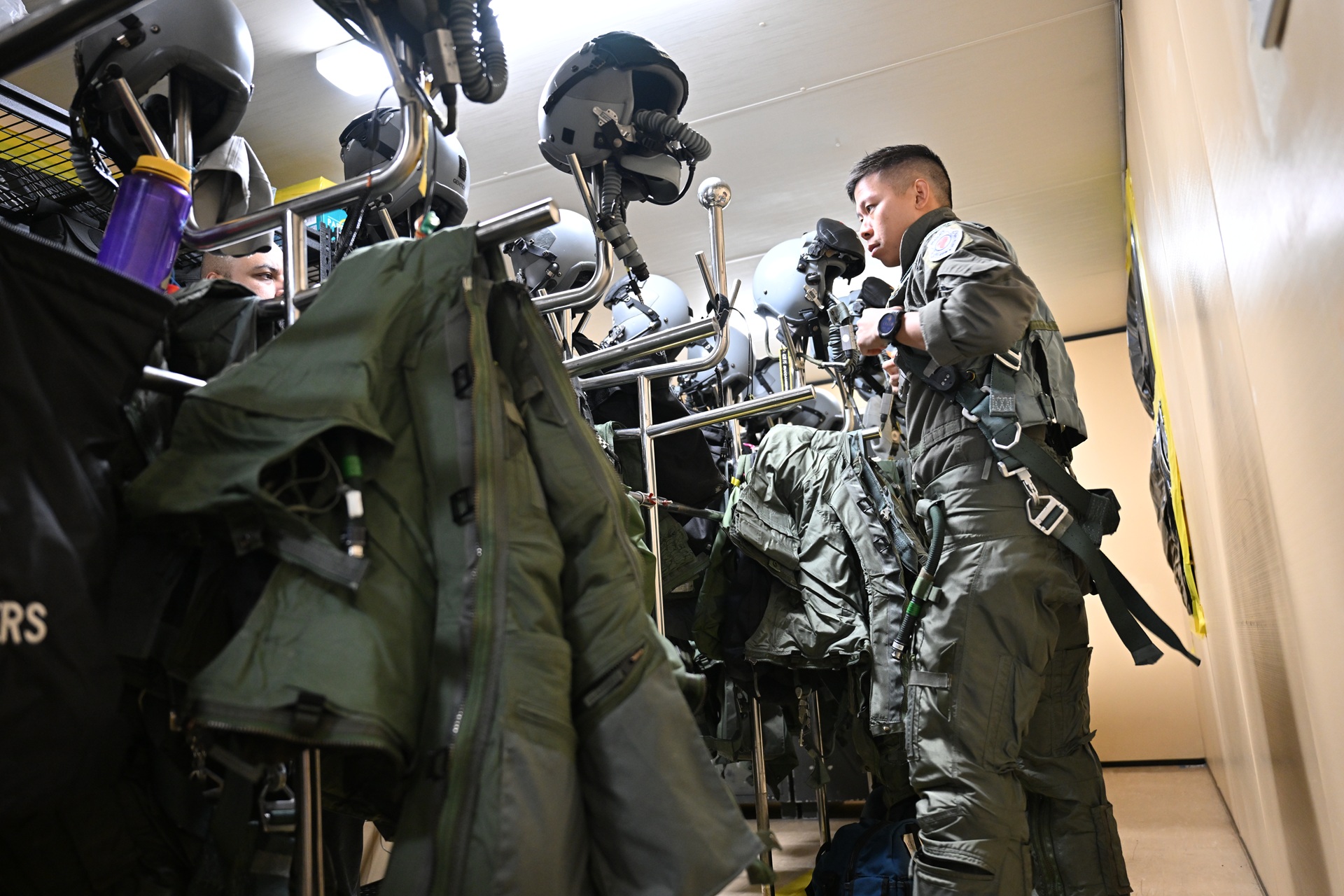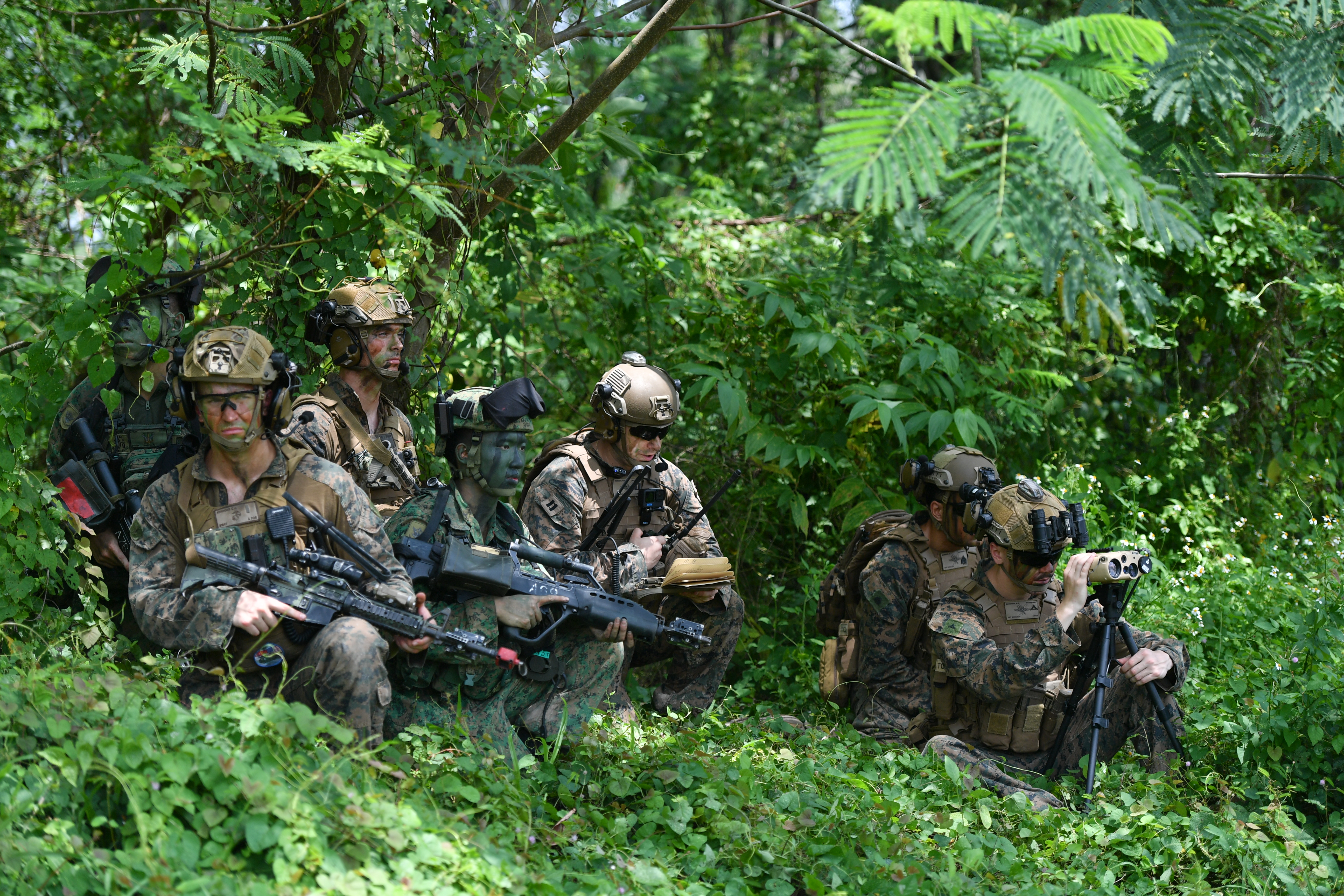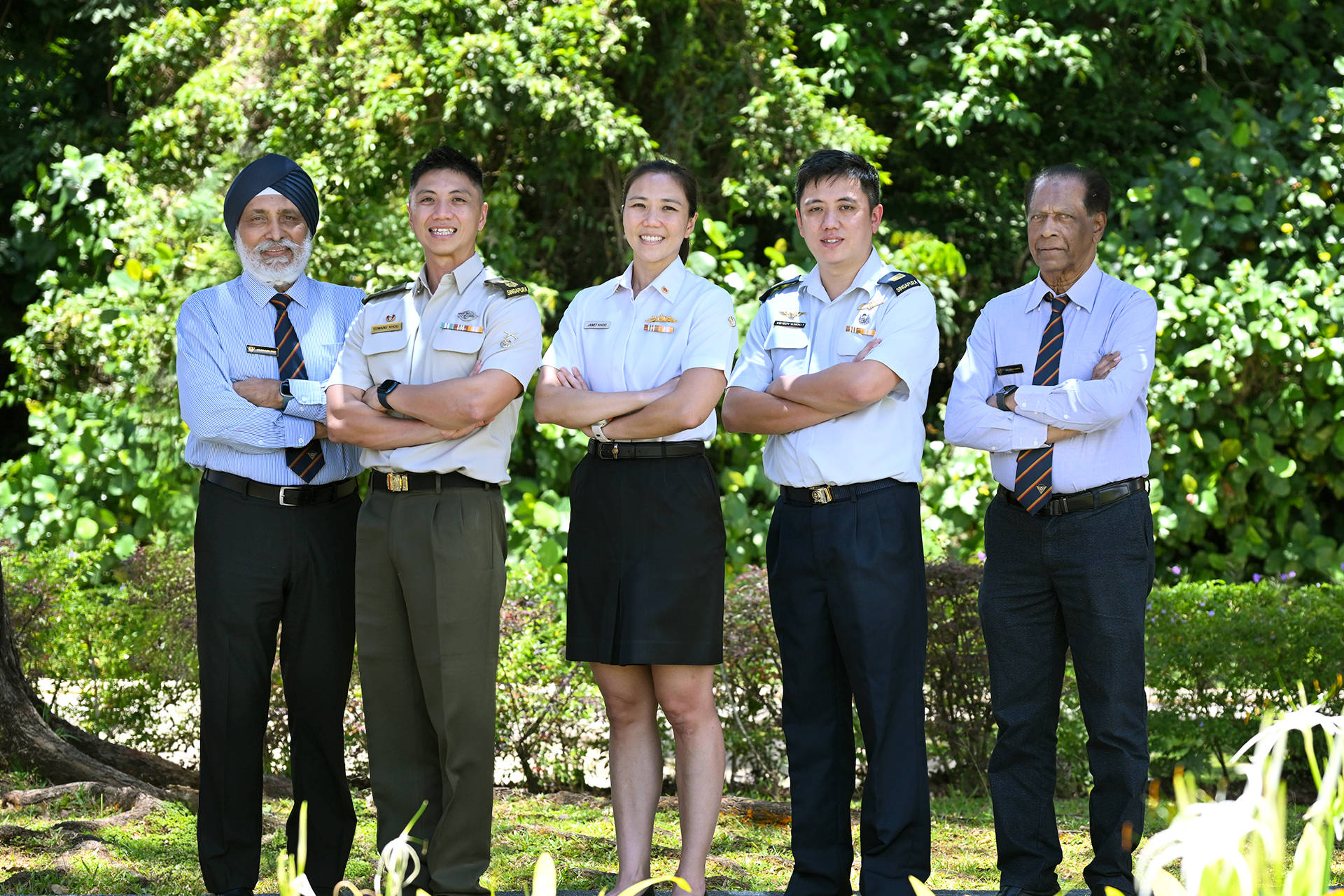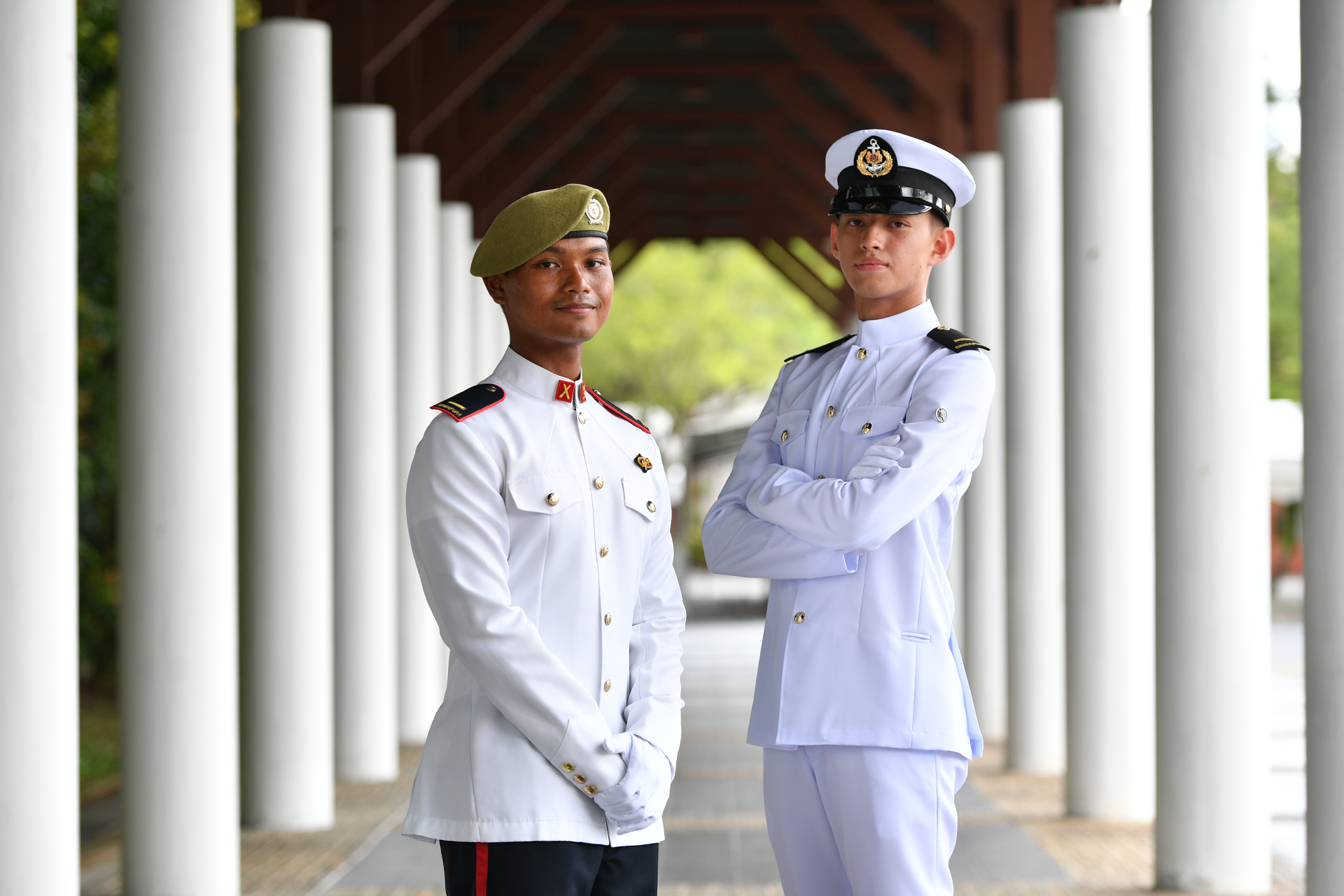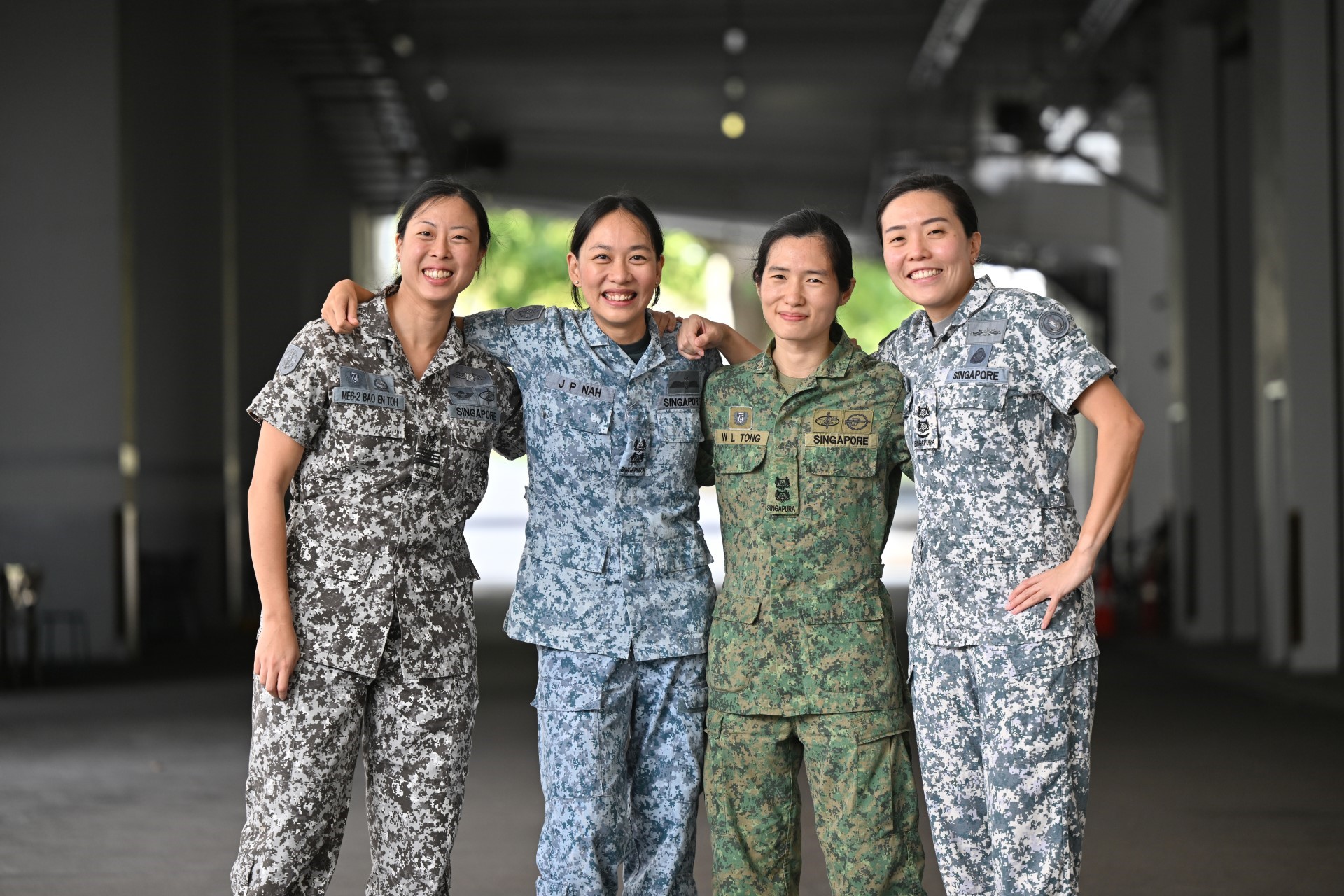WILL YOU STAND WITH ME?
PHOTO // Chai Sian Liang, Chua Soon Lye And courtesy of Rosemary Chng and Tan Tock Seng Hospital
This year's Total Defence campaign - with the above as its theme - rallies Singaporeans to unite in the face of challenges. PIONEER speaks to five groups of Singaporeans who embody this spirit.
Riding out the economic crisis
Founders Mr Hong (in jacket) and Ms Fang (on his left) with their pioneer batch of staff, who stood with the company through the recession.
When Asiawide Print Holdings was hit by the global recession in 2008 and 2009, some of its pioneer staff offered to take a pay cut to help the company tide over the crisis.
Despite the staff's good intentions, the management dismissed the suggestion.
"We figured that reducing their wages might add to their financial burden because some of their spouses had already suffered a pay cut or were retrenched," said Chief Business Officer and co-founder Terrence Hong.
"We (the management) felt that since we were thrown into the crisis together, we should get out of it together."
The local printing company, a small-and-medium-sized enterprise established in 2007, saw a 40 percent loss in sales revenue during the recession. The management also rejected the option to cut its manpower as a solution.
Chief People Officer Stephanie Fang said: "We had to make a conscientious decision. When we lay off a member of the staff, we're not only impacting one person, we're impacting the family that the person has to support."
Instead of retrenching workers, Mr Hong, 32, worked harder to raise the falling revenue. He sought to secure more deals with clients by offering them bundled packages at a competitive price. It worked.
Back in the office, a dip in printing orders had resulted in staff having more free time at work. To keep them occupied and motivated, continual improvement schemes were introduced. Staff came together and brainstormed ways to refine work processes, which helped the company bounce back after the recession.
"That was the time when our staff played a more active role in making the company better. They developed a greater sense of ownership and belonging along the way," Mr Hong observed.
From a strength of about 10 employees in the beginning, Asiawide Print has since expanded and now employs almost 50 workers. Looking back at how the company had managed to ride out the crisis, Mr Hong said: "Without our loyal employees and clients, it would have been hard to survive the period.
"Our main assets are our people, not our multimillion-dollar printers. I can choose which machines to buy and who to hire, but ultimately, the employees choose if they want to stick with the company in trying times."
"We stood together because...we felt that since we were thrown into the crisis together, we should get out of it together."
- Mr Hong, co-founder, Asiawide Print Holdings
Surviving the SARS epidemic
TTSH staff, donned in gowns manufactured by local textile companies, checking the temperature of then Minister for Health Lim Hng Kiang.
One hundred and fifteen gowns per minute. That was the fastest speed at which local garment-makers manufactured hospital gowns for local health-care workers.
During the 2003 outbreak which claimed 33 lives and infected over 200 people, Tan Tock Seng hospital (TTSH) was designated as the medical facility to treat Severe Acute Respiratory Syndrome (SARS) patients to prevent further spreading of the virus. Its staff used about 6,200 gowns, 2,000 masks and 33,000 pairs of gloves a day in the initial phase of the crisis.
Stocks ran low fast and there was soon a worldwide shortage of gowns and essential protective equipment as millions were used up every day by hospitals in SARS-affected countries.
A team of logistics experts from the Singapore Armed Forces, Defence Science & Technology Agency, Sembawang Logistics and International Enterprise Singapore turned to local textile manufacturers for help. Instead of importing the gowns, Singapore made its own.
The garment-makers - Sing Lun Holdings Ltd, Ocean Sky International Ltd and Pacific Garment Manufacturing Pte Ltd - rose to the challenge, despite having no experience in making hospital gowns.
Mr Lee (centre) and his core team, comprising (from left) factory manager Tan Mee Geok, production director Fan Lee Shyong, production control manager (then merchandising manager) Joelle Lee and technical manager Ang Siew Kiok. In May 2003, they worked late into the night to get the company's garment factory in Vietnam ready for gown production.
Rallying to support the nation
Chief Executive Officer of Sing Lun Mark Lee recalled visiting a hospital in May 2003 to discuss the requirements for the disposable gowns.
"The fabric had to be fluid-repellent, so that germs from sneezing and coughing could not penetrate. Its thickness had to be just nice, because the heat generated from wearing (the gown) may lead to discomfort," said the 39-year-old, who was then the company's project director.
The three textile companies had to churn out 2.5 million gowns within six weeks (a process which normally takes eight to 12 weeks). Sing Lun allocated up to 80 percent of the production capacity of its factory in Vietnam for the project. This meant delaying the delivery dates of existing purchase orders and rejecting incoming ones.
The company also gave up its short-term financial goals as it channelled its resources into manufacturing the gowns, which cost about one-tenth the price of the apparel it normally made.
"We explained to our customers that Singapore was facing a national crisis, so service to the country became our priority. They understood," said Mr Lee.
"We stood with Singapore because... our roots are here. It is only natural that we do our part to help."
- Mr Lee, CEO, Sing Lun Holdings Ltd
Showing community appreciation
Ms Chng, who spearheaded the ''Cookie Loves SGH'' initiative, called on Singaporeans to show their support for health-care workers.
Click to view GalleryWhile the garment-makers helped to clothe the health-care staff in protective clothing, Ms Rosemary Chng sought her friends' help in paying tribute to them for their courage and dedication.
It was American writer Helen Steiner Rice's poem, A Mother's Love, which sparked the idea, recalled Ms Chng. "It dawned on me that every health-care worker is somebody's child. And there they were, rising above all to treat the patients as the country was enveloped in a blanket of doom and gloom."
She continued: "So I thought, we needed to spread the love and tell them that they were not forgotten."
The 49-year-old businesswoman, who started volunteering when she was a Brownie at six years old, then decided on baking chocolate chip cookies. The reason was simple: whenever her children were feeling low, she would give them chocolate chip cookies and a warm glass of milk to cheer them up.
Ms Chng sent out hundreds of e-mails in May 2003, calling upon Singaporeans to participate in her "Cookie Loves SGH (Singapore General Hospital)" project. Over a hundred people from all walks of life responded.
More than 10 organisations, including the Singapore Management University (SMU), the Salvation Army and the Central Singapore Community Development Council, stepped in to render help. They contributed in all means and ways - from baking cookies and donating cookie premix to packing, storing and delivering them to the hospital.
In all, about 60,000 cookies were baked over three months. Packed in 6,000 jars, some decorated with handwritten "thank you" notes by the volunteers, the cookies were sent weekly to SGH.
Said Ms Chng on the outpouring of support from the community: "I was overwhelmed and happy that people were so willing to step forward. The project was not just about me wanting to do something, it was about the people coming together and showing support for the doctors and nurses in the nationwide fight against SARS."
"We stood with the health-care workers because...we wanted to tell them that they were not alone in the fight against SARS."
- Ms Chng, organiser of "Cookie Loves SGH"
Standing up for the disadvantaged
Meetings at Cadaq, a social enterprise set up by Mr Wong (second from left) and his wife Xiu Ting (second from right), are usually conducted using sign language and text-based communication.
"It's okay to fail" was the response that Mr Henry Wong, co-founder of Cadaq Pte Ltd, gave to his hearing-impaired staff when imperfections were found in their design projects.
This was not special treatment, but an opportunity for them to gain hands-on experience and grow with the company, he said.
The 39-year-old decided to set up the product design support company as a social enterprise after he returned from a business trip to the United States (US) in 2008. "The people in US did not see a difference between the able-bodied and the disabled," he said. Individuals with disabilities held professional jobs and integrated well into society. Inspired by the observation, he started Cadaq in 2010 and hired two hearing-impaired individuals who had technical and engineering backgrounds.
In the initial phase, meetings lasted for hours as Mr Wong communicated with them by typing on the computer. "Some of the vocabulary which I used to convey ideas were not found in sign language," he said. One of his staff, lead engineer Chung Yong Da, took the initiative to pick up simple sign language. Interaction among them improved as they grew to know one another better.
Besides imparting product design skills, Mr Wong taught them etiquette in the workplace by sharing his past experiences and taking them to meet clients. "We got a good glimpse of the fast-paced working world and learnt how to better fulfil our clients' needs," said design specialist Jordan Tay, 36.
Mr Wong also groomed his staff to become trainers. "The ultimate aim is for them to pass on their knowledge to the hearing-impaired community and empower more individuals. And once they fully understand how a business works, they might even be able to start their own company," he said.
"We stand with the disadvantaged because... with specialised skills and EQ (emotional intelligence) in the workplace, they can contribute to the company too."
- Mr Wong, co-founder, Cadaq Pte Ltd
Standing up for the disadvantaged
From cooking and ordering ingredients to cleaning the shop, the staff of Chicken Heaven cafe learn from director Mr Zakaria how to run an F&B business.
Mr Zakaria Abdul Gapor, 50, championed a similar social cause, helping his employees - the majority of whom come from low-income families, lack higher education or have medical problems - learn how to run a food and beverage (F&B) business.
He manages the Chicken Heaven cafe outlets, located in Bedok North and Changi Road, on behalf of Majlis Pusat, a Malay-Muslim non-governmental organisation. Mr Zakaria started the social enterprise with his friend, Muhammad Amir Abdullah, in March last year.
"We wanted to employ and teach disadvantaged people how to run a business, instead of just giving them cash to buy the necessities," said the Secretary General of Majlis Pusat.
Knowing their situations, he gives his staff the freedom to choose their rest days, as long as they fulfil the minimum requirement of working 30 hours per week.
While Mr Zakaria's hopes for his staff to become part-owners of the cafe may seem bold to many, they are taking baby steps to realise the goal. With his guidance, they are now confident of making decisions such as how much ingredients to order for the next day's operations. They are also more willing to interact with the customers.
These are marked improvements, said Mr Zakaria. "They used to call me whenever a decision had to be made. Some used to be shy as they lacked self-esteem, partly due to their education level and economic status."
As part of teaching them how an F&B business operates, Mr Zakaria also encourages his staff to come up with new dishes for the menu. Instead of simply approving or rejecting their suggestions, he would ask them to find answers to his logistics and pricing concerns. "A lot of patience is needed, but seeing them getting better each day, it's worth it," he said.
"We stand with them because... we want them to be empowered, socially and economically."
- Mr Zakaria, director, Chicken Heaven cafe
Spring into action for Total Defence!
As part of this year's Total Defence campaign, there are many activities for Singaporeans to participate. Be sure to join in the fun!
TD Challenge
On 15 Feb, Singaporeans from all walks of life will form up to 30 teams to work together and complete a mix of physical and mental tasks at various checkpoints around the island. Teams will raise funds for Community Chest charities by earning points for each completed task.
"Let's Stand Together" photo montage
Let s form the longest online human chain and show what it takes to stand with one another as friends and fellow countrymen! Take a photo of your arms outstretched and submit it to standwithme.sg.
"My Friend In Deed"
Tell a story of how someone has stood with you to achieve something remarkable or overcome a challenge. Submit your entry to facebook.com/ConnexionSG and stand to win prizes in the "Most Inspirational Story" or "People's Choice" categories!
21 Day Challenge
From 26 Jan to 15 Feb, bloggers including Dr Leslie Tay (ieatishootipost.sg) and Faz (thedramadiaries.com) will blog, tweet or post on Facebook a challenge a day for their followers to complete. Do it in your own creative way and be rewarded!
N.E.mation! 7
Vote for your top three favourite clips in this national animation competition on nemation.sg and stand to win prizes such as an iPad and Canon products!
For more details on how you can participate, log on to standwithme.sg.
